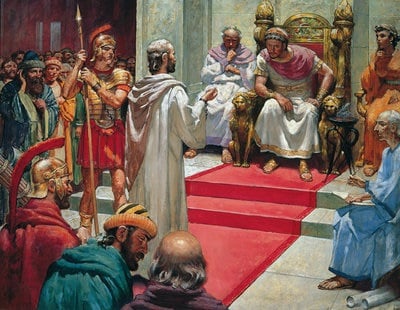Wednesday: Paul’s Defense
With the scene set and the royal guests seated alongside the governor, the prisoner was brought in to present his defense, which was aimed primarily at Agrippa, as Festus had already heard it before (Acts 25:8-11).
Read Acts 26:1-23. What was Paul doing in his speech before Agrippa?
Paul’s speech was in fact an autobiographical report of his life both before and after his conversion. In terms of content, it recalls the one in Acts 22:1-21, which he spoke before the crowd in Jerusalem.
The apostle began by trying to secure Agrippa’s favor. He acknowledged his gratitude for the opportunity to state his case before such an eminent person, all the more so because Agrippa was well acquainted with all the customs and issues related to Jewish religion. For that reason, Agrippa could be of great assistance in helping the Roman governor understand that the charges brought against him had no merit and were false.
The speech can be divided into three parts. In part one (Acts 26:4-11), Paul described his former Pharisaic piety, which was widely known among his contemporaries in Jerusalem. As a Pharisee, he believed in the resurrection of the dead, which was essential to the fulfilment of Israel’s ancestral hope. The Jews, therefore, were being inconsistent in opposing his teaching, for there was nothing in it that was not fundamentally Jewish. But he understood their attitude quite well, and that was because he himself had once found it so incredible that God could have raised Jesus that even he persecuted those who believed that way.
In part two (Acts 26:12-18), Paul reported how his perspective had changed since his encounter with Jesus on the road to Damascus and the call that he received to take the gospel message to the Gentiles.
Paul says, finally, that the impact of what he had seen (Acts 26:19-23) was such that he had no choice but to obey and to carry out his missionary activity, the only reason that he was now on trial. The real issue behind his arrest, therefore, was not that he had violated the Jewish law or desecrated the temple. Rather, it was because of his message of Jesus’ death and resurrection, which was in full harmony with the Scriptures and allowed believing Gentiles to have an equal share in salvation.
| Read Acts 26:18. According to that text, what happens to those who have salvation in Christ? How have you experienced this reality? |


King Agrippa
His great grandfather tried to kill Jesus
His grandfather beheaded John the Baptist
His father had murdered the first apostle
Paul could not expect a favorable outcome from this testimony.
What could make him happy given the history?
Paul found a delight in speaking the gospel of Christ in every given opportunity.
He enjoyed talking about his conversion story.
Do you remember the first time you fell in love with Jesus?
How often do you repeat your love story?
Amen! This did not have a favorable outcome for Paul, and yet King Agrippa had free will and the ability to choose Christ in spite of his unbelieving family members. Such is the love and mercy of Jesus!
If it wasn’t for Christ in my life I’d have no real meaning to live. He is the very reason for me to be alive. When I think of daily toils and challenges, I have to thank God because He is in the control of all! He is amazing. God’s love has such a beautiful declaration representes by His Son Jesus. And it is because of Him that I live.
Agrippa felt convicted by The Holy Spirit through Paul’s speech and was afraid
Fear comes from a denial of God’s love/offer of salvation. Acceptance of God’s plan leads to joy and love. And “there is no fear in love”. (1 John 4:18).